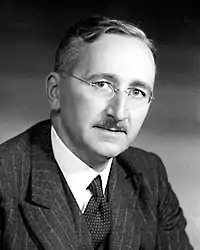Friedrich Hayek
Friedrich August von Hayek, CH (8 May 1899 – 23 March 1992) was an Austrian-British economist and political philosopher. He became known because he strongly defended liberalism and free-market capitalism. He was against too much central control of the economy and society. He thought that forms of government like socialism were not good for the economy, and damaged freedom of the individual. Hayek's signature work, The Road to Serfdom, refers to the consequences of socialism.
Friedrich August von Hayek | |
|---|---|
 | |
| Era | 20th-century philosophy |
| Region | Western philosophy |
| School | Old Whig, Classical liberalism and Austrian School |
Main interests | Economics, social philosophy, political philosophy, philosophy of mind |
Notable ideas | Economic calculation problem, Catallaxy, Extended order, Dispersed knowledge, Spontaneous order |
Influences
| |
Influenced
| |
He was one of the most important economists and political philosophers of the 20th century.[1] He was one of the most important members of the Austrian School of economics. He also had many ideas in the fields of jurisprudence and cognitive science. He shared the 1974 Nobel Prize in Economics with his rival Gunnar Myrdal. The award was for their work in the theory of money and economic fluctuations; also for their analysis of the inter-dependence of economic, social and institutional phenomena.[2] He also received the U.S. Presidential Medal of Freedom in 1991.[3] He is thought to be one of the major causes of change from the Keynesian policies of the first part of the 20th century. Instead of governments handling the details of the economy, they went back towards classical liberalism in the 1980s and later. This happened most clearly in the 1980s in the U.S.A. (under Ronald Reagan) and the U.K. (under Margaret Thatcher).
Main books
- Profits, interest and investment: and other essays on the theory of industrial fluctuations, 1939.
- The road to serfdom, 1944. ISBN 978-0-226-32055-7
- Individualism and economic order, 1948. ISBN 978-0-226-32093-9
- The counter-revolution of science: studies on the abuse of reason, 1952. ISBN 978-0-913966-67-9
- Hayek, F.A. (2011). The Constitution of Liberty: The Definitive Edition. University of Chicago Press. ISBN 978-0-226-31539-3.
- Law, legislation and liberty (3 volumes)
- The fatal conceit: the errors of socialism, 1988. ISBN 978-0-226-32066-3
Related pages
References
- Edward Feser (ed) 2007. The Cambridge Companion to Hayek. Cambridge University Press. p13 ISBN 978-0-521-84977-7
- Bank of Sweden (1974). "The Sveriges Riksbank Prize in Economic Sciences in Memory of Alfred Nobel 1974".
- George H.W. Bush (1991). "Remarks on presenting the Presidential Medal of Freedom Awards".
- Hayek, F.A. (1978-02-15). Law, Legislation and Liberty, Volume 1: Rules and Order. University of Chicago Press. ISBN 978-0-226-32086-1. Retrieved 2011-09-14.
- Hayek, F.A. (1978-10-15). Law, Legislation and Liberty, Volume 2: The Mirage of Social Justice. University of Chicago Press. ISBN 978-0-226-32083-0. Retrieved 2011-09-14.
- Hayek, F.A. (1973). Law, Legislation and Liberty, Volume 3: The Political Order of a Free People. University of Chicago Press. ISBN 978-0-226-32090-8.